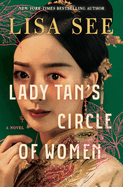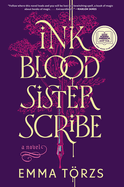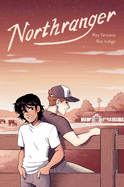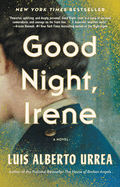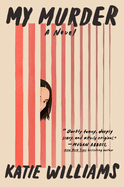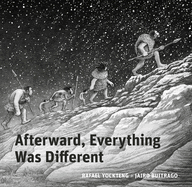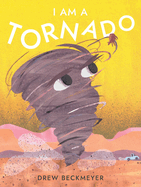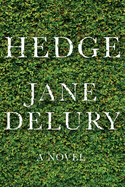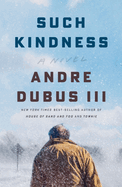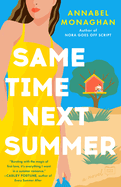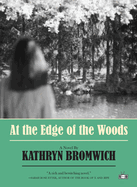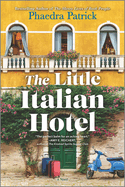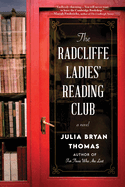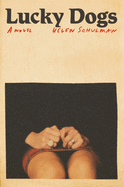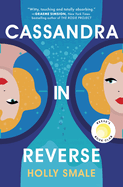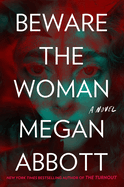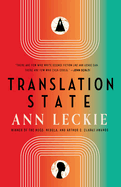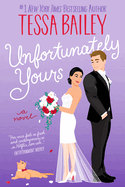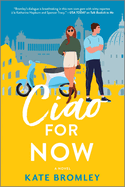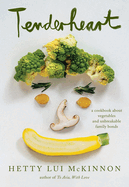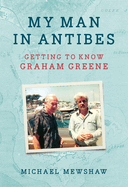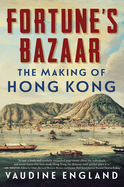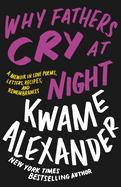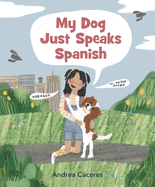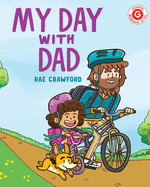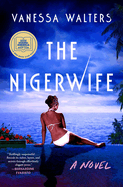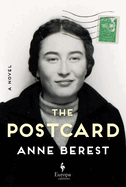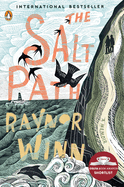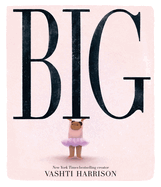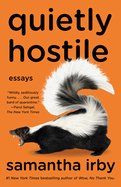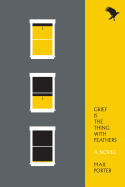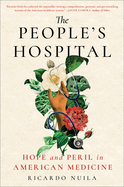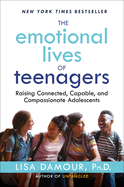Friday, June 9, 2023
We review some terrific fiction this week: the heroine of Lisa See's Lady Tan's Circle of Women is "as captivating and credible as any character in contemporary fiction," though the book's set in 15th-century China; long-separated sisters discover the truth of their magical heritage in Ink Blood Sister Scribe, Emma Törzs's "skillfully plotted, character-driven debut"; and Northranger by Rey Terciero, illus. by Bre Indigo, reimagines Jane Austen's Northanger Abbey as a "playful queer teen love story" in graphic form. Plus so many more!
In The Writer's Life, Luis Alberto Urrea describes his mother's experiences as a Red Cross "Clubmobile" worker in World War II Europe as the inspiration for his novel Good Night, Irene.
Lady Tan's Circle of Women
by Lisa See
Tan Yunxian, the heroine of Lisa See's 11th novel, is as captivating and credible as any character in contemporary fiction, even though Lady Tan's Circle of Women is set in 15th-century China. Strict norms circumscribe her existence, but friendship and intellect empower her to lead an extraordinary and satisfying life. See (The Island of Sea Women; The Tea Girl of Hummingbird Lane; China Dolls) bases her novel on the book of medical cases by the real-life Lady Tan Yunxian, published in 1511. The result is a moving, first-person narrative shining with meticulous research about Ming dynasty culture and daily life.
In 1469, Yunxian's mother teaches her eight-year-old daughter how to care for her agonizing bound feet, as well as her place in the world: "We are a man's possessions. We women exist to give him heirs and feed, clothe and amuse him." Growing up and approaching her "hair-pinning days," all leading to an arranged marriage, Yunxian acknowledges her restrictions while eagerly learning from her grandparents, who are respected doctors. Grandmother shares matters of the "child palace" and "issues below the girdle," which male doctors must not treat. Once she is married, Yunxian surreptitiously offers medical advice to the concubines and relatives in her new husband's grand home, and eventually wins their approval. Her controlling mother-in-law even welcomes Yunxian's lifelong friend, the midwife Meiling, into the compound. Vibrant details of medical practices and rigid social traditions--and even a murder mystery--enhance this story of an abiding friendship and an exceptional woman in a male-dominated society. --Cheryl McKeon, Book House of Stuyvesant Plaza, Albany, N.Y.
Discover: Set in 15th-century China, this moving story of a talented female doctor who earns society's respect includes historic details of the male-dominated culture at the time.
Ink Blood Sister Scribe
by Emma Törzs
Long-separated sisters discover the truth of their magical heritage and the evil forces that seek to exploit it in Ink Blood Sister Scribe, Emma Törzs's skillfully plotted, character-driven debut. Half sisters Joanna and Esther have lived apart for years. Joanna stayed home, protecting the family's collection of magical books in isolation. Esther must move and stay moving for 24 hours every year on November 2--for reasons their father never fully explained. She didn't even return for his funeral. Esther is tired of uprooting her life every year and doesn't want to leave her girlfriend, so she takes a risk and stays at her job in Antarctica. That decision changes everything.
Törzs tells Ink Blood Sister Scribe through three points of view and adeptly weaves the narratives as the mystery develops. Gorgeous but not overwritten prose balances violent scenes, depictions of coercive abuse, and the crafting of books written in blood. The characters, sheltered in different ways, show nuanced growth emotionally and in their relationships.
The magic system is built on a familiar foundation--magical books and secret groups that make and collect them--but the details are inventive. Törzs expertly crafts a character-driven conclusion that keeps readers in suspense but isn't rushed, drawing out the why and the how, even if readers already know the who. Ink Blood Sister Scribe will speak directly to fans of Alix E. Harrow, Seanan McGuire--and magical libraries. --Suzanne Krohn, librarian and freelance reviewer
Discover: With dark magic, complicated family dynamics, and lots of twists, this debut contemporary fantasy is perfect for fans of Alix E. Harrow and Seanan McGuire.
Good Night, Irene
by Luis Alberto Urrea
Serving up "fresh hope with a cup of joy," two Red Cross volunteers accompany frontline troops into the horrors of World War II Europe in Good Night, Irene by Luis Alberto Urrea (The House of Broken Angels). They are armed only with coffee urns and a donut fryer, and sustained by an immediate and deep friendship. Irene, fleeing an abusive fiancé in New York, and Dorothy, so enraged by her brother's death at Pearl Harbor that she abandons her family's Indiana farm, commit to serving in a role available to women in 1943--Red Cross Clubmobile staff. They become "a perfect donut-coffee machine" team in their two-tone truck-kitchen, entering Europe after D-Day and offering the troops smiles, banter, and what "might be the last blessing from home."
The author, inspired by his mother's Clubmobile service, skillfully portrays the miseries the women endure, juxtaposing their witty dialogue and bravado with unsparingly detailed brutalities of war. Irene and Dorothy evoke hope for every "khaki saint" and for each other, a "nest of self where they felt safe." Unarmed, they nonetheless face frontline battle conditions. Deep in Allied-occupied Germany, as soldiers share rumors about "someplace called Buchenwald," the Americans savor the charming 17th-century atmosphere, a civilized hotel, and pastries: "Everybody laughed, everybody forgot the war was just outside the door, just for a minute." A dramatic climax, despite the story's wartime ironies and horrors, offers a ray of hope amid heartbreak. As Dorothy recalls the "Donut Dollies" years later, she tells her granddaughter: "Women are called upon to piece the world back together." --Cheryl McKeon, Book House of Stuyvesant Plaza, Albany, N.Y.
Discover: Two Red Cross volunteers serve frontline World War II soldiers coffee and support in a historically detailed novel both brutal and inspiring.
My Murder
by Katie Williams
For Louise, the weird thing isn't so much that she was murdered and then brought back to life--cloned, along with several other female murder victims. What perplexes her is that, due to an effect of the replication process, she can't remember her murder or the days leading up to it. There lie the sci-fi and mystery elements of My Murder, Katie Williams's of-its-own-ilk fantasy-thriller hybrid, which is further distinguished by its whittled-to-perfection prose.
The novel's beginning and middle find narrator Louise, three months into her cloning, reacclimating to life as a married mother, resuming her job as a touch therapist and trying to recall her murder. To ease their readjustment, the victims of Edward Early's killing spree--"He was leaving women all over mid-Michigan, crumpled on benches, on roads, on playground toys, like a trail of silvered candy wrappers"--attend a serial killer survivors' group. ("The name was a lie," notes Louise. "None of us had survived.") About two-thirds of the way into My Murder, there's a shudder-making plot twist and a ratcheting up of Williams's withering critique of the obsession with true crime, and the favoritism shown to certain victims of violence; as someone says to Louise about her selection by the replication commission, "you were a case they could make--a pretty, young, white woman.... You weren't out at night.... You were blameless." How Williams (Tell the Machine Goodnight) manages to lace her narrative with biting social commentary without diluting the novel's black comedy is another mystery entirely. --Nell Beram, author and freelance writer
Discover: In this blackly comic and of-its-own-ilk fantasy-thriller hybrid, a woman who was killed is brought back to life through cloning but can't recall her murder or the days leading up to it.
Hedge
by Jane Delury
Hedge by Jane Delury (The Balcony) is a roller coaster of a novel about family, creation, love, and shifting priorities, lush with detail and delicately rendered.
Maud is a garden historian, "with her odd mix of botany, archaeology, history, and practical gardening skills," and she loves her work. Originally from California, she was well suited to England, but reluctantly returned to the United States for her husband Peter's career. When Hedge opens, Maud is at work on a restoration project in New York's Hudson Valley. It is beautiful, stimulating work, and she is likewise stimulated by the company of Gabriel, a handsome, intriguing archeologist at work on the same site. Her two daughters, Ella and Louise, are about to join her for the rest of the summer. Peter remains in California: the couple has separated "both geographically and maritally," and Maud plans to make this separation permanent and legal, but their girls don't know this yet. On the cusp of an affair with Gabriel, she feels enlivened, awakened by his attention, her own physicality, the thrill of discovering flower beds from the Civil War era and the turning of the earth. She allows herself to dream of what a new life could look like for her as well as for the scotch roses, lilac, clematis, and honeysuckle she plants. But when the girls arrive from California, 13-year-old Ella suffers a trauma that snowballs into life-changing events for all involved.
Both a quiet domestic tale and a novel of surprising suspense, Hedge cycles from hopeful to harrowing and back again. Maud is nurturing and steely, riveting and unforgettable. --Julia Kastner, librarian and blogger at pagesofjulia
Discover: In this profound novel about love, loss, and choices, a summer's exciting work and an exhilarating affair will reverberate through the lives of a deeply likeable protagonist and her family.
Such Kindness
by Andre Dubus III
The deluge of recent punditry--in both good faith and bad--on the plight of the working class can make it easy to forget the power of stories to reveal their lives. But in Such Kindness, novelist Andre Dubus III (Dirty Love; Townie) dramatizes working-class suffering with a detailed first-person perspective--and does so without the simplifications of a political mold. Though New England homebuilder Tom Lowe was living well--with a good wife, a healthy son, and a beautiful home he had the painful pleasure of building--the water was at his head. The price for this home was a steep mortgage, his body ached from constant physical labor, and his emotional withdrawal and obsessive work ethic stood between him and his wife and son. Then Lowe falls from a third-story roof, mangling his hips. The loss of work, crippling pain ("I have spent many hours contemplating pain"), opioid addiction, foreclosure, divorce, alcohol addiction, poverty, and the contempt of his son deny him his comforts, dignity, and reasons for living.
With tender, masculine prose in the tradition of post-war American realism--with a dash of 19th-century novelistic social criticism--Such Kindness is the story of a working man's rock bottom and resurfacing. --Walker Minot, writer and editor
Discover: From Andre Dubus III comes a drama of New England working-class suffering, an account of the world's immense cruelty but also the extraordinary powers of love, sacrifice, and redemption.
Same Time Next Summer
by Annabel Monaghan
Annabel Monaghan's delightful second novel for adults, Same Time Next Summer, dives into the second-chance romance trope to heartbreaking and ultimately heartwarming effect. Monaghan (Nora Goes Off Script) follows a pair of neighbors through their teenage romance, a disastrous breakup, and their chance to reconnect some years later.
Spending summers next door to each other on Long Island, Sam and Wyatt fall head over heels in love: surfing, swimming, hanging out in the treehouse in Wyatt's backyard. Their sweet, sun-soaked romance contrasts with Monaghan's present-day narrative, which sees Sam and Wyatt revisiting Long Island as adults. Sam, now engaged to a type-A city guy and reeling from a major work crisis, returns to her family's beach house for the first time in years. She's almost convinced herself she's over Wyatt, until she realizes he's (again) spending the summer next door. As Sam and Wyatt encounter--and avoid--each other, the truth of the last decade comes out in pieces, until they're forced to reckon with past mistakes and find out what their adult selves really want.
Monaghan's narrative shifts between past and present, with Sam and Wyatt sharing their perspectives in the "Then" and "Now" timelines. Sam's warm, chaotic family makes multiple appearances; her younger sister, Gracie, and their grandparents are especially appealing characters. Sam's inner journey adds complexity to the narrative: she's got some personal work to do before she can straighten out her romantic tangles. Mixing summer stardust with a dose of plain truth-telling, Same Time Next Summer is a delectable romantic treat. --Katie Noah Gibson, blogger at Cakes, Tea and Dreams
Discover: Annabel Monaghan's delightful second novel is a second-chance summer romance with surprising depth of insight.
At the Edge of the Woods
by Kathryn Bromwich
Kathryn Bromwich's first novel, At the Edge of the Woods, both chills and charms with its fable-like story of a woman beginning a new life alone in a cabin outside a small Italian village.
First-person narrator Laura Mantovani is determined to simplify and forget: she revels in her close attention to her daily walks, her observations of nature, her humble fare, and austere human contacts. She supports her modest lifestyle with translations of medical texts for the village apothecary and tutoring a few well-off children; in the evenings, she reads widely. She briefly takes a lover, before retreating into still deeper solitude and communion with the natural world. Readers wonder what she has escaped from--until a contact from her past life turns up on the doorstep.
Bromwich's prose is sedately paced, erudite, and textured in its observations of nature. Laura has a sly sense of humor and a deep distrust of humankind. As her story advances, her relationship to reality shifts and slides. She has visions. "The woods seem to have taken on unusual colors--not just deeper but slightly off. Certain tree trunks appear a lurid purple; tangerine and teal leaves wave in the breeze." The villagers call her strega (witch), because an independent woman alone is otherwise too much to grasp. Laura has created a new life for herself, a world in which her needs make sense in new ways, but human society still looms.
At the Edge of the Woods is wise, ethereal, haunting, filled with both beauty and horror. Brief but thoughtful, lush in its descriptions, this is a novel of introspection. --Julia Kastner, librarian and blogger at pagesofjulia
Discover: A woman reinvents herself in solitude but finds the tension with humanity remains in this finely textured novel set in the Italian Alps.
The Little Italian Hotel
by Phaedra Patrick
Five strangers are brought together on an Italian holiday in Phaedra Patrick's The Little Italian Hotel, a sweet and immersive novel brimming with the hope of new beginnings. To celebrate 25 years of marriage, Ginny Splinter--a 49-year-old, problem-solving British radio talk-show host--surprises her husband, Adrian, by planning an upscale trip to Italy for the two of them. But when she presents the gift, Adrian announces that he doesn't want to go on a vacation. He wants a divorce. Shaken and jarred, heartsick Ginny decides on a lark to invite, at random, four loyal listeners to accompany her on the trip instead. This is accomplished by her swapping out the pricy luxury accommodations she'd planned for her and Adrian in Vigornuovo, a small Italian village in Bologna, for more modest lodgings for herself and her guests. The five strangers--ranging in age from 27 to 80--meet for the first time and then set off, touring Venice and Florence. The sights of Italy may be wonders to behold, but the life stories of the strangers--each on the cusp of change--prove equally enriching during the journey.
Patrick (The Messy Lives of Book People) is a talented writer of optimistic stories that probe the true meaning of life and the human quest to find happiness and fulfillment. In The Little Italian Hotel, she once again mines the bittersweet landscape of the human heart with great tenderness, insight, and wisdom. --Kathleen Gerard, blogger at Reading Between the Lines
Discover: The Little Italian Hotel is a tender, hopeful story about a woman who, after her marriage comes undone, sets off on an inspiring Italian holiday with four strangers.
The Radcliffe Ladies' Reading Club
by Julia Bryan Thomas
Julia Bryan Thomas's second novel, The Radcliffe Ladies' Reading Club, explores the power of books and unexpected friendships to change women's lives. After escaping an oppressive marriage, Alice Campbell opens a bookshop in 1950s Cambridge, Mass., and starts a book club that attracts four young women from Radcliffe College. The students--aspiring artist Merritt, farm girl Evie, scholarship student Tess, and socialite Caroline--each struggle in their own ways with the transition to college life. Alice hopes to use the book club to challenge the girls' preconceived notions of a woman's place in the world. Over the course of an eventful year, the book club and the girls' friendships do change their lives, though not in the ways Alice (or any of them) expected.
Thomas (For Those who Are Lost) gives readers a peek into each girl's perspective while painting a finely detailed portrait of Cambridge in the middle of the 20th century. During the fall semester, the four girls become fast friends despite their differing personalities, backgrounds, and ambitions. A traumatic incident at a dance leaves the group shaken and splintered--with Alice on the outside, not knowing how to help. Thomas explores the limited range of choices open to (white, relatively privileged) college women in the 1950s when the expectation of marriage and children often still trumped higher education. The narrative centers on the echoing consequences of seemingly small decisions--and the possibilities that such decisions sometimes engender. Thomas's novel is a tribute to books and bookshops and a nuanced portrait of female friendship and its complications. --Katie Noah Gibson, blogger at Cakes, Tea and Dreams
Discover: Julia Bryan Thomas's second novel centers on an informal book club at Radcliffe College and the unexpected consequences for its members.
Lucky Dogs
by Helen Schulman
Talk about rerouting: readers who enjoy novels that start in one place and venture into unpredictable directions will admire Lucky Dogs, a novel by Helen Schulman (Come with Me; This Beautiful Life). Meredith Montgomery is a 24-year-old actress who refers to herself as one of the "lucky dogs"--someone from an underprivileged childhood who moved to L.A., "started dating high rollers," and became a star. At the novel's outset, however, she's hiding in a cheap Paris Airbnb, subsisting on ice cream, and working on a memoir about a man she calls the Rug, a powerful producer, "with that fake black toupee like a furry Frisbee on his egg-shaped pate." He's based on Harvey Weinstein, and--as Weinstein accuser Rose McGowan did--Meredith has taken to Twitter to publicize that he assaulted her.
While in Paris, she meets a woman who calls herself Nina and claims to belong to an organization called W2, a women's rights group. Readers will think they know where this is going, but Schulman has a surprise: Nina is not the person she claims to be. Schulman divides her tale between Meredith's and Nina's stories, slowly revealing the connections between them. The two stories don't mesh as neatly as they could have, but Schulman has a knack for writing indelible and affecting scenes. And she presents a nice contrast between the lives of privileged Hollywood types and those whose circumstances are substantially more challenging. Lucky Dogs howls with rage but doesn't offer easy answers. Talk about impressive. --Michael Magras, freelance book reviewer
Discover: Lucky Dogs, based in part on Rose McGowan and Harvey Weinstein, tells the stories of an actress challenging a powerful, abusive producer and a sympathetic woman who isn't what she claims.
Cassandra in Reverse
by Holly Smale
Popular YA author Holly Smale (the Geek Girl series) makes her adult debut with Cassandra in Reverse, a hilarious, introspective, time-hopping journey with an unforgettable, neurodivergent heroine. Cassandra Dankworth ("I sound like a cross between a Greek heroine and a killer's basement") has lost her job, her relationship, and her chance at a banana muffin, all in one day. Her coupled-up flatmates, Sal and Derek, want her to move out so they can have the place to themselves. The tendency to say exactly what she thinks and her inability to read the feelings of others have always made life difficult. This time she gets an unexpected chance at a do-over when she wakes up on what should be the next morning, only to find herself reliving the same day. She quickly learns that she can travel to moments in the recent past and change her choices. However, fixing her relationship and career isn't easy, given that she's not sure why they were broken, and she keeps crossing paths with a mysterious woman she's determined to avoid. As her failed restarts pile up, Cassandra begins to wonder if she's chasing a fresh start for the right reasons, or trying to force the world and herself into shapes that won't hold.
Cassandra's first-person narration is caustic, vulnerable, and laugh-out-loud funny as she time-jumps with a rapidity most people reserve for channel surfing. Smale's expanded take on the Groundhog Day concept is a wildly fun journey of self-discovery, perfect for fans of imaginative, intelligent speculative fiction. --Jaclyn Fulwood, blogger at Infinite Reads
Discover: A woman discovers she has the ability to relive and change the recent past in this smart, hilarious story of self-discovery.
Mystery & Thriller
Beware the Woman
by Megan Abbott
Megan Abbott (Give Me Your Hand; You Will Know Me) stands in her own league with her outstanding novels focusing on gender politics and the concerns of young women from unconventional backgrounds. Abbott continues this focus in her superb, suspense-laden Beware the Woman, a novel that delves into manipulation.
Channeling a bit of Rebecca and Gaslight, Beware the Woman focuses on second-grade teacher Jacy, whose bad relationships with men seem to be inherited from her mother's perpetual involvement with dismissive, married men. Then Jacy marries quiet, nice guy Jed Ash only four months after meeting him and without knowing him very well. Now, nearly two years later, the couple, happily expecting their first child, travel to visit Jed's father. Jed rarely mentions him, a retired physician in his isolated home on Michigan's Upper Peninsula. At first, "Doctor Ash" lovingly welcomes the couple, telling Jacy, "we are so lucky to have you." But his housekeeper, Mrs. Brandt, seems to despise her. When complications with her pregnancy arise, Jacy feels trapped as neither Jed, his father, nor a local doctor will allow her to leave. Instead they recommend bed rest, talk about her health and plans for the baby, and ignore her opinions.
Abbott's affinity for finely tuned pacing enhances the tension as Beware the Woman delves into in-depth character studies, misogynistic behavior, and love. Jacy, with her "hurricane of hormones," wonders if her feelings about being trapped are real or if the men are keeping her a prisoner, caring only about the baby--not her. Abbott continues to be a provocative writer. --Oline H. Cogdill, freelance reviewer
Discover: A young pregnant woman believes she's being kept prisoner by her husband and father-in-law, who seem to care about only the baby in this superb, suspenseful thriller.
Science Fiction & Fantasy
Translation State
by Ann Leckie
Ann Leckie's Translation State, a stand-alone entry in the Imperial Radch universe, weaves fascinating alien societies and interstellar governmental intrigue in a thrilling and thought-provoking adventure. Enae Athtur (pronouns sie/hir) spent many years caring for hir now-deceased Grandmaman, who left hir--primarily as a means to provide for hir--a government post. Enae is ostensibly searching for a translator for the Presger, an advanced and mysterious alien race that went missing more than 200 years ago; nobody expects hir to do more than travel and file expenses. When Enae decides to see what happens if sie actually investigates, hir path crosses with Reet Hluid, an orphan whose genetics hint at mysterious origins.
Meanwhile, Qven, on the cusp of adulthood and intended for an important position in their clade, suffers an attack and disgrace. The repercussions only cement Qven's terror at what awaits them in maturity. When all three come together, the result is a legal battle, hinging on what it means to be a person, that threatens a treaty with an alien species so mysterious that conspiracies question their very existence.
Once again, Leckie (Provenance) constructs an intricate science fiction backdrop, otherworldly yet comprehensible, and uses it to ground questions of family, selfhood, and fate. Although Translation State is self-contained, those who have read the trilogy beginning with Ancillary Justice will appreciate seeing some familiar elements of its culture and learning more about the Presger. Fans of philosophical science fiction will be enthralled. --Kristen Allen-Vogel, information services librarian at Dayton Metro Library
Discover: Gripping interstellar politics set the stage for a legal battle over self-determination and the meaning of personhood.
Romance
Unfortunately Yours
by Tessa Bailey
Unfortunately Yours, the second entry in beloved romance novelist Tessa Bailey's rom-com duet set in Napa Valley, is a steamy, laugh-out-loud, enemies-to-lovers delight. Natalie Vos has spent the last few months getting drunk and watching her brother single-handedly save their family's vineyard while landing the girl of his dreams. Now, ready to move on from the shattering disappointment of losing her job and fiancé in New York, Natalie is ready to prove herself by starting her own business--if only she could get her hands on her trust fund. But her estranged father's terms dictate that she can't access the money until marriage. (Un)fortunately, Natalie knows that August Cates, an ex-Navy SEAL trying to honor the memory of his late best friend, needs her Napa Valley clout to get his new vineyard some respect. Too bad Natalie and August can't seem to stop fighting--and wanting each other--every time they try to talk about this potential (strictly business) arrangement.
Unfortunately Yours is a perfect mix of characters Bailey (Hook, Line, and Sinker; It Happened One Summer; Fix Her Up) likes to write--hardworking, blue-collar hunks and fiercely determined, funny heroines--and swoony tropes that she hasn't wielded as often, like enemies-to-lovers and fake-it-till-you-make-it relationships. Natalie and August's chemistry is clear at the start, from their quirky, hilarious banter. And though their (very heated) romance is certainly the novel's focus, the rest of the story's cast of characters from dreamy Napa Valley (including an endearingly cantankerous cat, and the stars of Bailey's prequel, Secretly Yours) adds to the novel's warmhearted sensibility and charm. --Alice Martin, freelance writer and editor
Discover: A crowd-pleasing, funny romance, Unfortunately Yours is sure to please Tessa Bailey fans and newcomers alike with its fun-loving, feisty leads.
Ciao for Now
by Kate Bromley
Ciao for Now, the delightful third rom-com from Kate Bromley (Here for the Drama), whisks readers away for a sun-drenched summer in Rome, complete with mouthwatering pasta, iconic sights, and a healthy dose of romantic (and existential) angst. Violet Luciano is proud to have won one of three coveted internship spots at Italian fashion house Gia Luca, and she's determined to win the end-of-summer competition for a designer job back home in Manhattan. But her own insecurities and her hostess/professor's grumpy son, Matt, both threaten to jeopardize her plans.
Bromley's narrative zips along, giving readers a front-row seat to Violet's witty, mile-a-minute inner monologue. Violet is a likable people pleaser who's still recovering from a career left turn and a breakup with her not-quite-ex, Greg. She quickly makes connections in Rome, including with the owner of a local fabric boutique. But as she agonizes over her designs for the competition, her relationship with Matt--which got off to a rocky start when she accidentally destroyed his laptop--ventures into steamier territory. Juggling her design work, her friendships with fellow interns Holly and Marco, and her budding romance proves a challenge for Violet. It will eventually force her to consider what she wants most--and what might be holding her back.
Breezy, fun, and packed with luscious descriptions of couture designs and Roman landmarks, Bromley's narrative is both a charming love story and a thoughtful exploration of a woman trying to let go of the past and discern what she truly wants for her future. --Katie Noah Gibson, blogger at Cakes, Tea and Dreams
Discover: Kate Bromley's breezy third rom-com combines a summer in Rome with a whirlwind romance and a peek into the fashion industry.
Food & Wine
Tenderheart: A Cookbook About Vegetables and Unbreakable Family Bonds
by Hetty Lui McKinnon
Hetty Lui McKinnon (To Asia, with Love; Neighborhood) is known for bright, plant-based dishes, and Tenderheart: A Cookbook About Vegetables and Unbreakable Family Bonds offers an abundance of brilliant recipes as well as brief but thoughtful essays on family, grieving, rituals, and, of course, the 22 vegetables featured in this collection. McKinnon brings a global perspective rooted in Chinese culture and the flavors of her family into every page of this beautifully photographed (by the author herself) and well-written cookbook and memoir, the narrative of which centers on the unexpected death of her father when she was 15. In the author's note, McKinnon explains: "Some may see this as a book about loss, but I see it as a story about life, an exploration of love, human resilience and unbreakable family bonds."
The book is divided into sections organized around a single vegetable, each with a brief essay. When introducing Asian greens, McKinnon compares choy sum to kale, writing that it "brings a tapestry of more considered, bitter-earth flavors, along with a robust sturdiness." The recipes are easy to follow, often relying on familiar pantry goods to create unexpected twists on basic ideas. Helpful header notes provide welcome suggestions, and potential substitutions are listed at the close of many recipes. The book also offers a robust index, organized by ingredients. For fans of McKinnon's work or those just discovering her, Tenderheart is sure to delight with mouthwatering dishes and beautiful reflections on the many legacies that can be found around a dining table. --Sara Beth West, freelance reviewer and librarian
Discover: Chinese Australian cook and food writer Hetty Lui McKinnon makes vegetables the star of this collection, which is also woven with beautiful reflections on family and loss.
Biography & Memoir
My Man in Antibes: Getting to Know Graham Greene
by Michael Mewshaw
A 20-year friendship with Graham Greene is the subject of My Man in Antibes, a memoir by Michael Mewshaw (Sympathy for the Devil; Between Terror and Tourism). Long before Mewshaw, a peripatetic writer who spent many years living in Italy with his family, met the 68-year-old Greene in 1972, he'd become fascinated by the elder author. "Greene's deceptively simple style and straightforward storytelling are as hard-worked and finely wrought as hammered silver," writes Mewshaw. These are qualities he loves so much that he and wife Linda honeymooned in Haiti, the setting of Greene's The Comedians. When Mewshaw learned that Greene lived close to the French villa where he and Linda were living, he wrote to him. Greene responded by inviting them over for drinks, and a long friendship began.
This memoir chronicles Mewshaw's sometimes cordial, sometimes rocky relationship with Greene, which lasted until Greene's death in 1991. The cordial bits included frequent dinners together and Greene's encouragement of Mewshaw's writing. Relations briefly cooled after Greene took umbrage over a 1977 profile Mewshaw wrote that appeared in the Nation and the London Magazine. Mewshaw reprints the piece in its entirety, along with the letters he and Greene exchanged, with the latter expressing "horror" at perceived inaccuracies, and Mewshaw trying to make amends. What emerges is an up-close portrait of Greene, with many juicy details. Among them: Greene was so technically inept he couldn't change a light bulb. This is a rare, firsthand look at the one of the 20th century's greatest authors. --Michael Magras, freelance book reviewer
Discover: In My Man in Antibes, novelist and critic Michael Mewshaw chronicles his 20-year friendship with legendary author Graham Greene.
History
Fortune's Bazaar: The Making of Hong Kong
by Vaudine England
Fortune's Bazaar, a lively history of Hong Kong by journalist Vaudine England (The Quest of Noel Croucher), explores the diverse people who built the city into a multicultural world metropolis. Situated "bang central" in eastern Asia, Hong Kong's geography is as unique as its history: comprised of one main island (among 260 others) and the Kowloon Peninsula, it became a British Crown Colony in 1841 on the strength of its deep-sea harbor and nearness to the opium trade. The currents brought myriad people, ideas, and technologies to Hong Kong, where the "spoor" was dropped that helped make it "a place in between all others, but special in itself." Key to this transformation were the "in-between people" who facilitated trade as interpreters, bookkeepers, secretaries, and suppliers--the main agents of multicultural discourse and commerce.
Describing the rich "hybridity" of Hong Kong post-1841, England's study reads much like the "glorious mosaic" of the people who met, mixed, and made families beyond the marketplace: each chapter delivers vibrant vignettes of the opium traders, missionaries, intellectuals, and entrepreneurs who formed the fabric of Hong Kong well into the 20th century. The "energy and lubrication" Hong Kong brought to world trade is because of these "chameleons" who overstepped the limits of "class, colonial, or racial fencing" to build their own communities and, England argues, become "Hong Kongers." In a guarded coda, England reflects on Hong Kong's uncertain future under communist China's "ethno-nationalist" regime and what it may portend for this multicultural way station. Fortune's Bazaar is a meticulously researched yet deeply human portrait of those who bucked taboo to create a distinct community and a thriving Asian port city. --Peggy Kurkowski, book reviewer and copywriter in Denver
Discover: Hong Kong's past comes alive in this captivating account of the "in-between" people who transformed the city into a global market hub and multicultural community, one that defies easy definition.
Poetry
Why Fathers Cry at Night: A Memoir in Love Poems, Letters, Recipes, and Remembrances
by Kwame Alexander
Why Fathers Cry at Night: A Memoir in Love Poems, Letters, Recipes, and Remembrances is a singular form, the music of a life movingly sampled and remixed by poet Kwame Alexander (The Door of No Return; Booked; The Crossover). Alexander dedicates this poignant memoir to his daughters, often addressing them directly and with a wry tenderness as he explores his various loves and losses. To them, these pieces might serve as instruction, as seen in "Prelude to Love," which concludes with the promise of "...a lifetime/ of lessons, tender stories of/ longing and loss/ that will never leave you/ long after I have."
He also speaks of and to other significant women in his life: his grandmother, mother, and his "literary mother," poet Nikki Giovanni. In many ways, the memoir is a series of lessons in love, captured in the countless small gestures and big displays that demonstrate it. One of those gestures is the act of preparing a meal for someone, and for Alexander that is a central act of his becoming. The recipes here are not abundant, but they showcase parts of his past, such as "7UP Pound Cake," and even of his future: "Pastalias," replicating something his mother used to make, is a recipe he admits is a work in progress; he writes, "I've only made this... once, and the truth is, it wasn't great." But, he adds, "It's a start. You've got something to build on."
And perhaps that's what this series of reflections is doing: offering himself and his readers insight into where he's been and insisting on the possibility of continued growth, even as Alexander faces the uncertainties before him. --Sara Beth West, freelance reviewer and librarian
Discover: Why Fathers Cry at Night is a poignant memoir in singular form, a life sampled and remixed by poet Kwame Alexander.
Children's & Young Adult
Northranger
by Rey Terciero, illus. by Bre Indigo
Rey Terciero and illustrator Bre Indigo, the team behind Meg, Jo, Beth, and Amy, reimagine Jane Austen's Northanger Abbey in graphic novel form, portraying a closeted gay Latinx teen falling for a white boy whose secrets might explain why his lake house seems haunted.
Sixteen-year-old Texan Cade Muñoz is stuck working on a ranch all summer to help his broke family. It's at least fun flirting with Henry, the ranch owner's son, who shares Cade's love of horror movies. When they all go to the Northranger, a maybe-haunted lake house built in 1887 with a forbidden west wing and flickering lights, Cade catches Henry and his dad arguing: " 'Keeping this secret is eating us alive.'... 'We need to protect this family.'... 'Like we protected Momma?' " Cade wants to trust Henry, but another worker's cryptic warnings--"Death follows that boy"--has Cade worried he's becoming a horror movie trope.
Northranger demonstrates the heavy burden of isolation and fear, and how it can warp reality. In between depictions of homophobia and self-doubt are buoying supportive scenes, hilarious moments (Cade scaring himself with a Ouija board), and romantic gestures ("Is it corny to say I wanna be Prince Charming for you? Or Cowboy Charming?"). Indigo incorporates clever visuals; the page behind panels is white during the day and black at night, inviting readers into both the trepidation and intimacy of the darkness. A black background is also used when characters go to difficult places mentally. Manga-style iconography adds levity, and the pink-tinted, two-color format allows copious character blushing. Readers be warned: only pick up this book if there is time to finish it in one sitting. --Samantha Zaboski, freelance editor and reviewer
Discover: This playful queer teen love story delightfully blends the creepy mystery of a haunted house with the sultry setting of a summer ranch.
Afterward, Everything Was Different: A Tale from the Pleistocene
by Jairo Buitrago, illus. by Rafael Yockteng, transl. by Elisa Amado
Author Jairo Buitrago, illustrator Rafael Yockteng, and translator Elisa Amado (Lion and Mouse; Drawing Outdoors) collaborate once again with the mostly wordless, deeply inspiring Afterward, Everything Was Different, in which detailed illustrations imagine how a transformative moment in history might have unfolded.
According to Buitrago and Yockteng, the Pleistocene era, which occurred "somewhere between two and a half million and ten thousand years ago," was a time when people roamed the earth, living closely with animals, hunting with spears and clubs, wearing furs or nothing at all, and "slowly becoming more like the people we are today." One observant girl is featured--she helps keep her small clan safe from predators, leads the group over treacherous paths, and takes moments to look at the stars. She also watches and learns. On a fateful day when the others leave the cave, this girl stays behind. She grabs a stick of burnt wood and transforms the wall of the cave into a story--the story of the clan--which she then performs orally. And, of course, "afterward, everything was different."
Yockteng magnificently illustrates Afterward, Everything Was Different in graphite and ink drawings. Sweeping panoramas give a sense of the immensity of the wide-open space, as well as huge beasts that dwell there. Two expressive notes at book's end, translated from the Spanish by Amado, describe the history and inspiration behind this book, and put it neatly into context. This is a moving tribute to the power of art through the ages. --Lynn Becker, reviewer, blogger, and children's book author
Discover: The deeply inspiring Afterward, Everything Was Different offers detailed illustrations and explanatory back matter to imagine how a transformative moment in history might have unfolded.
I Am a Tornado
by Drew Beckmeyer
Could it be that what's behind a tornado's fury isn't a meteorological imperative but an anger-management problem? So conjectures Drew Beckmeyer (The Long Island) in I Am a Tornado, which is so hilarious and psychologically astute that any other authors contemplating a picture book about a cow playing therapist to a whirling windstorm should probably think twice, as their offering is unlikely to measure up to this one.
The anthropomorphized tornado at the book's center is as egotistical as one might expect. "I AM SO BIG AND I AM SPINNING SO FAST," the tornado says as it swallows up a cow. The cow's plea for mercy--"Could you put me down?"--is rebuffed: "NO. WATCH THIS!" The cow tries a new tack: "Tornado, is everything okay?" The tornado flatly denies that it could be having any issues. The cow, ceaselessly compassionate, continues to press. Finally, the tornado lets down its guard: "IF I DID DECIDE TO PUT YOU DOWN, WOULD YOU RUN AWAY?"
It's all as wonderfully wacky as it sounds, the essential lesson about the importance of being honest with oneself never eclipsing the comedy at the book's heart. Working in chunkily cut paper in blunt colors against vivid backdrops, Beckmeyer injects some science into the silly, using arrows to indicate that wind results from the collision between warm air and cold air, creating a "swirling rage funnel." I Am a Tornado may well encourage some young readers to say "I am upset" instead of becoming destructive storms of emotion, but if that fails, at least the book will make them stop and smile. --Nell Beram, freelance writer and YA author
Discover: This hilarious and psychologically astute picture book conjectures that an anger-management problem is behind a tornado's fury.
My Dog Just Speaks Spanish
by Andrea Cáceres
Andrea Cáceres, originally from Venezuela, demonstrates her love of dogs and languages in her debut picture book, My Dog Just Speaks Spanish, a diverting story that also creates a fun opportunity for both English- and Spanish-speaking children to expand their language acquisition.
"When Aurora came to the United States, she learned to speak English." But Nena, her adorable Cavalier King Charles Spaniel, only obeys Spanish commands. Cáceres shows the language difference right away: Aurora sits in her room, surrounded by markers, writing notes like "CAMA = BED," "CONEJO = RABBIT," and "HOLA = HELLO." Floppy-eared Nena enters the room and immediately chews up all Aurora's carefully written learning aids. Next, Aurora and Nena head to the park, where Aurora demonstrates Nena's listening skills: when Aurora says "SIÉNTATE," Nena sits; Nena doesn't obey when Aurora says "WAIT," but stays still for "ESPERA." (Observant readers will notice that Nena lets a squirrel escape because she listens to her owner.) When English-speakers can't communicate with Nena, Aurora teaches them Spanish words by drawing on the path with chalk, but she and Nena especially love it when they meet other Spanish-speakers.
Cáceres's digital illustrations have a childlike flair and are filled with textures, speech bubbles, and handwritten bilingual notes. Humans and dogs alike wear giant smiles as the pets run, jump, roll, and give, as Nena knows them, "BESOS." My Dog Just Speaks Spanish is a delightful romp with a beloved pet and a valuable language lesson to boot. --Melinda Greenblatt, freelance book reviewer
Discover: In this diverting picture book debut, Aurora and her dog Nena teach young readers vocabulary words in English and Spanish as they enjoy their daily walk.
My Day with Dad
by Rae Crawford
A child and dad pack a surfeit of joyous activities into their day together in the exuberant slice-of-life early reader My Day with Dad from designer and comic artist Rae Crawford (creator of the webcomic I'm Broken. Send Help.).
The endpapers show a smiling, bouncy-haired, amber-skinned child and their cheery white father waving goodbye to brown-skinned Mom. On the first page, the young protagonist dances while informing the reader, "I am having a day with my dad." Soon flour spatters and pancakes fly as "I mix. Dad flips," and the family's adorable dog swipes a strip of bacon. After breakfast and chores, their planned bike ride falls victim to a dreary storm, but a round of board games brings the mood back up until the sky clears. An afternoon of kite-flying, puddle-splashing, and cloud-watching flies by too quickly, but Dad keeps the good times rolling with movie night and a pillow fight before a calming bedtime story. The child's contentment echoes in their understated yet impactful thought, "It's nice to have a day with my dad."
Crawford's cartoon-style digital drawings have a wonderful feeling of movement and buoyancy, with wind-tossed trees, taut-stringed kites, and one wiggly pup. The vibrant palette amps up the energy in this down-to-earth narrative that reflects the lives of many families. Characters have clear, expressive faces with frequent smiles. Readers ready for short sentences with mostly one-syllable words will find a cozy, feel-good outing awaiting in this comforting celebration of the bond between dad and child. --Jaclyn Fulwood, youth experience manager, Dayton Metro Library
Discover: A father and child enjoy a day of small adventures in this vibrant, feel-good easy reader.
In the Media
The Writer's Life
Luis Alberto Urrea: 'We Are Here to Bear Witness'
 |
|
| (photo: JP Calubaquib) | |
Poet, novelist, and nonfiction author Luis Alberto Urrea was born in Mexico to a Mexican father and an American mother. He has won multiple literary awards, most recently for his 2018 novel The House of Broken Angels. The Devil's Highway, a nonfiction narrative of Mexican immigrants lost in the Arizona desert, was a 2005 Pulitzer Prize finalist. His ninth work of fiction, Good Night, Irene (Little, Brown; reviewed in this issue), inspired by his mother's service as a Red Cross "Clubmobile" worker in World War II Europe, follows the women who provided donuts and hope to the troops, forging friendships as they cheered the soldiers while enduring the horrors of war. Urrea and his family live in Naperville, Ill., where he is a distinguished professor of creative writing at the University of Illinois-Chicago.
You are well known for your writing on Mexican American themes, especially The Devil's Highway, and your novel The House of Broken Angels. Good Night, Irene, is set in WWII Europe. What inspired you to pursue this topic?
My mother. This is the heroic epic that her service in the Red Cross called out for. In my work, I almost always honor my family and my culture--my mother happened to be the only American in a sea of Mexicans.
How was writing a novel based on your mother's experiences different from shaping characters in earlier novels?
The characters in this novel are shaped characters--it's a work of fiction. That being said, like The Hummingbird's Daughter, it is grounded in real history, real places, and a true timeline. The characters in the novel are imagined; however, they are shaped, colored, and nuanced by my mother and her war buddy Jill. If you keep an eye open as you read, Phyl and Jill make cameos in a couple of places. My subliminal way of saying "this story is about Irene and Dorothy."
In my earlier novels, I was generally in a pretty specific place/time, peopled with specific characters. The fun thing in this World War II milieu was I had a lot more freedom because anybody could be from just about anywhere. For example, I pretty freely populated my created universe with the veteran grandparents and parents of friends and readers who shared their stories with me.
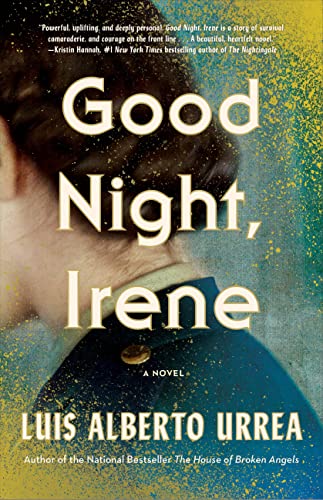 Good Night, Irene is rich in dialogue, much of it including 1940s references and slang. How did you research the language of the era?
Good Night, Irene is rich in dialogue, much of it including 1940s references and slang. How did you research the language of the era?
Drove my editors crazy! Fortunately, they are obsessive compulsives, and they helped weed out slang that might have been from the '50s. There are many available websites of slang from different decades in the U.S., and I have a wonderful dictionary of military terminology and slang called FUBAR. But of course, I heard some of it from my elders as a boy. The best was the time my wife and I spent with the only surviving Clubmobiler, Jill Pitts Knappenberger. We both basked in that palaver in Jill's apartment.
In your novel, Dorothy describes a group of soldiers of diverse backgrounds, saying, "Ain't we a bunch. Ain't we America." Was your characters' diversity significant?
Absolutely. I felt it incumbent upon me to represent the best dream of democracy in the face of fascism. It was both a celebration and a warning. When you begin to look into WWII, you find every ethnicity, every political view, every accent, every color. Sometimes struggling with the prejudices of the day, sometimes segregated, yet learning that, under fire, we were all Americans. It was a profoundly human message. Thus, the Latino and other soldiers of color, Indigenous, immigrant, midwestern farmboy, beautiful rabble that populates the novel. On a personal note, I was heartened by how many Mexican-American soldiers fought for our country.
I did the bulk of the writing of this novel during the turmoil of the last few years and this was my small way of offering a corrective to the divisions and polarizations of this era.
Reviewers have praised your works for evoking contradictory emotions. Viet Thanh Nguyen cited The House of Broken Angels as showing "love and pain, joy and resentment, hatred and reconciliation." Your new novel prompts tears of both sorrow and joy. Do you consciously craft these opposites?
Isn't that the human condition? If it were all giggles or all torment, it isn't honest. Even the profoundly dark and hopeless novel Under the Volcano by Malcolm Lowry is hilarious. The light and the shadow bring each other into better focus and poignance. On a craft level, I would say there are precipitous falls into horror and despair in my book. And as a composer, I strive to ease the readers out of the abyss so that the story can continue, much like those women did. They did not become goths. They used their spunky personas to pick up and move forward.
This novel, as well as The Hummingbird's Daughter, have exceptionally bold women protagonists. As a teacher, what would you advise your students who might question their skill at presenting a perspective they can't experience?
I tell my students we are here to bear witness. If you bear false witness, it is a sin.
You'd better make sure your eye is well-calibrated and focused; you'd better make sure that your prejudice and power of assumption is dialed in and not spouting propaganda, rhetoric, or opinions. Not only do you need to know what and who you are talking about, you need to know that you are not furthering toxic, inaccurate canards.
These people, these genders, these ethnicities are not tropes. We have all suffered this sort of toxic thinking long enough. You'd better check yourself. If you have a trusted representative of whatever group/gender/ethnicity you are exploring that you can give your work to for an opinion, do it. If you don't, or if you are nervous for them to see it, you are in the wrong game.
People have been treated with enough disrespect and condescension to last us for all time. This may make me sound like a hippie, but I am dead serious about this: I tell my writers "Fill your pen with love or don't bother picking it up." And I suggest they take a long hard look at what the word "love" means to them. I would begin the definition with "respect."
You are accomplished in many genres. How does your approach to composing in different forms vary?
My new book of poetry, Piedra, just published this month, and it was something I was working on even as I was working on this novel. At the same time, I was working on a nonfiction piece for a major magazine about the lives of Mexican migrants working in the heartland without documents. I don't want to say that I live in my notebooks, but... I live in my notebooks. One of my models early on was Leonard Cohen, who wrote songs, poems, and novels. I knew right away that was the kind of writer I wanted to be. It all fascinates me. As precious as this may sound, to me, writing is prayer.
Of course, there is a difference between a whopping historical novel and a haiku. But it is about one's engagement with this life. My joke I share with my workshops when this question comes up is: if you are moved by dewdrops on the face of a sunflower, it's probably a poem. If your mother was an unsung hero of WWII, it had better be a big fat book. --Cheryl McKeon, Book House of Stuyvesant Plaza, Albany, N.Y.
Book Candy
Book Candy
"Scholars have released the first words chosen for The Oxford Dictionary of African American English," Mental Floss reported.
---
"Novel crimes: which is worst--folded corners, cracked spines, marginalia or cheese bookmarks?" the Guardian asked.
---
A statue of author Willa Cather was unveiled in National Statuary Hall of the U.S. Capitol.
---
The New York Public Library recommended "warmhearted stories of connection" for fans of the HBO series Somebody Somewhere.
Rediscover
Rediscover: Ama Ata Aidoo
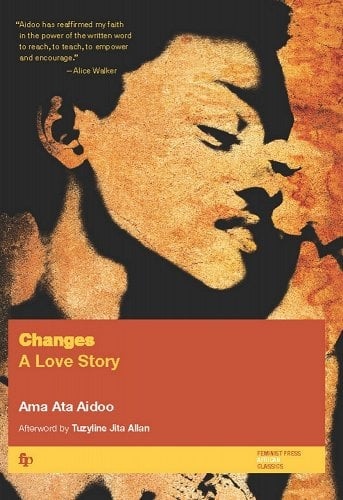 Ama Ata Aidoo, a Ghanaian playwright, author and activist "who was hailed as one of Africa's leading literary lights as well as one of its most influential feminists," died May 31 at age 81, the New York Times reported. In a career that included writing plays, novels, and short stories, stints on multiple university faculties and, briefly, a position as a cabinet minister in Ghana, Aidoo "established herself as a major voice of post-colonial Africa."
Ama Ata Aidoo, a Ghanaian playwright, author and activist "who was hailed as one of Africa's leading literary lights as well as one of its most influential feminists," died May 31 at age 81, the New York Times reported. In a career that included writing plays, novels, and short stories, stints on multiple university faculties and, briefly, a position as a cabinet minister in Ghana, Aidoo "established herself as a major voice of post-colonial Africa."
Her breakthrough play, The Dilemma of a Ghost (1965), "explored the cultural dislocations experienced by a Ghanaian student who returns home after studying abroad and by those of his Black American wife, who must confront the legacies of colonialism and slavery. It was one of several of Ms. Aidoo's works that became staples in West African schools," the Times wrote.
Aidoo's novel Changes: A Love Story won the 1992 Commonwealth Writers' Prize for best book (Africa). Her landmark debut novel, Our Sister Killjoy, or Reflections from a Black-Eyed Squint (1977), "recounted the experiences of Sissie, a young Ghanaian woman who travels to Europe on a scholarship to better herself, as such a move was traditionally described, with a Western education. In Germany and England, she comes face to face with the dominance of white values, including Western notions of success, among fellow African expatriates," the Times noted.
A Fulbright scholar who spent years as an expatriate, Aidoo experienced feelings of cultural dislocation as well. "I have always felt uncomfortable living abroad: racism, the cold, the weather, the food, the people," she said in a 2003 interview published by the University of Alicante in Spain. "I also felt some kind of patriotic sense of guilt. Something like, Oh, my dear! Look at all the problems we have at home. What am I doing here?"
She accepted an appointment as Ghana's minister of education in 1982, with the goal of making education free for all, but resigned after 18 months when she realized the extent of the many barriers she would have to overcome to achieve that goal. After moving to Zimbabwe in 1983, she developed curriculums for the country's Ministry of Education. She founded the Mbaasem Foundation in 2000 to support African women writers.
Aidoo "was a major Pan-Africanist voice, arguing for unity among African countries and for their continued liberation. She spoke with fury about the centuries of exploitation of the continent's natural resources and people," the Times wrote. Changes: A Love Story is available from Feminist Press.


